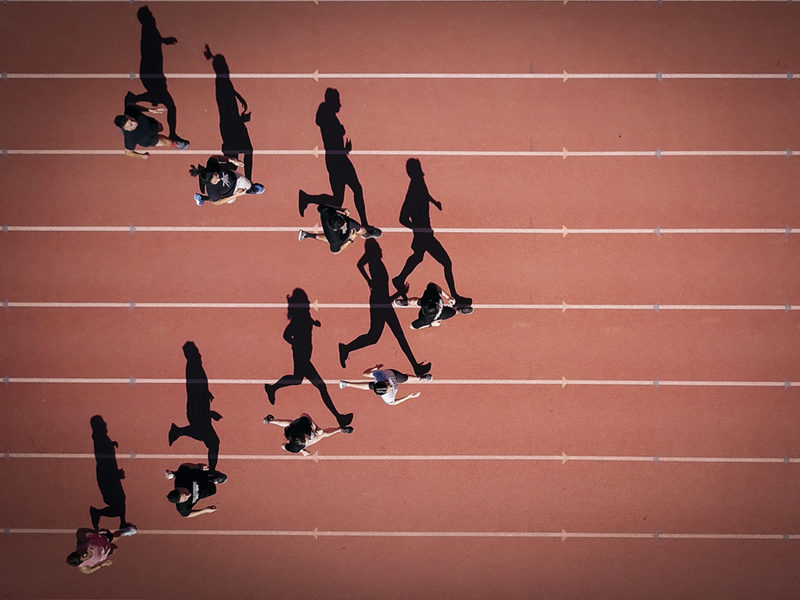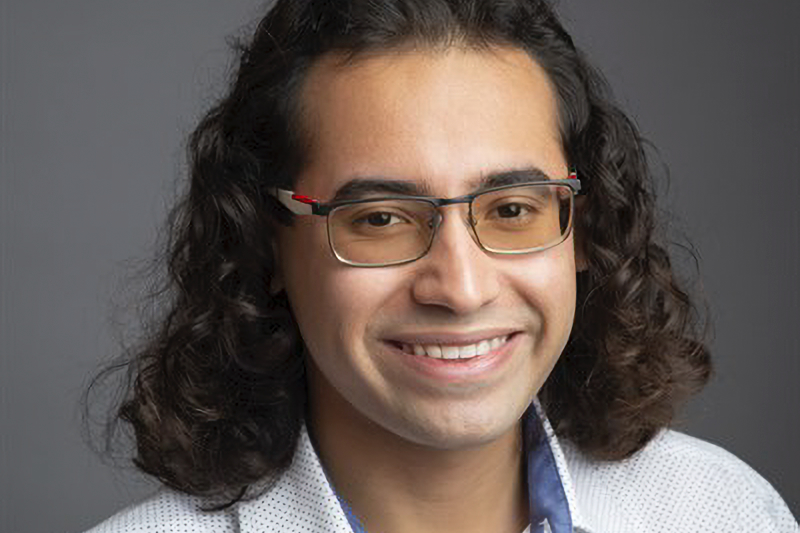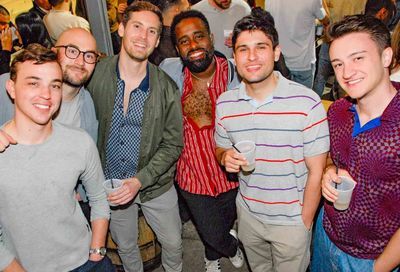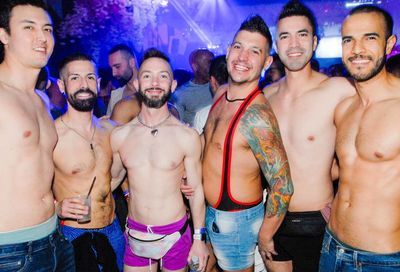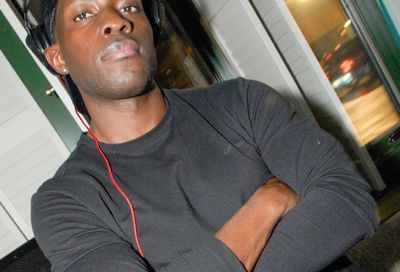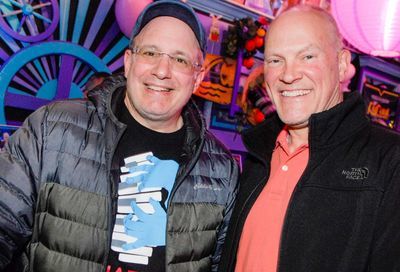Schuyler Bailar: Harvard’s history-making transgender swimmer
Schuyler Bailar made history as the first out transgender male NCAA Division I athlete. Now he hopes to inspire other trans youth.

“Swimming fast has very little to do with talent,” says Schuyler Bailar. “It’s about how hard you work and what you want to do with it, and if you’re committed. Sure, there are people who are very talented, but they are also incredibly committed. It doesn’t really matter how talented I was or I am. It’s that I was committed to doing it and that I worked really hard.”
Hard work, drive and dedication are essential parts of Bailar’s life story. The 20-year-old sophomore on Harvard University’s swim team, is known for his 100- and 200-meter breaststroke. He’s been swimming since he was a year old, and competing since the age of eight. By 13, he was practicing twice a day, competing not only for his school, but as part of a local swimming club.
As a child, Bailar was athletic. He played multiple sports, including soccer, lacrosse, skateboarding and Taekwondo, but instead of playing for the girls’ teams, Bailar played for boys’ sports teams — at least, until middle school, when sports became segregated.
“I did self-identify as a tomboy,” says Bailar. “I said that constantly. It was something that I really wanted people to know about me because I think it was my way of explaining that I wasn’t a girl, like everybody thought I was supposed to be.”
As he grew older, Bailar became more aware that his body didn’t match his identity, though he didn’t have the words to explain the way he felt. Following his senior year, he had a breakdown and deferred attending Harvard for a year to seek help for an eating disorder. During treatment, he came out as transgender.
After leaving rehab, Bailar was worried about balancing his identity as a transgender male with competing for Harvard’s women’s swim team. The women’s head coach approached a colleague, who suggested Bailar swim for the men’s team. The young swimmer would ultimately make history as the first openly transgender NCAA Division I swimmer and the first publicly documented NCAA Division I transgender male to compete in any sport.
The transition between teams was not easy. Bailar not only had to compete against men, but had to get back into competitive shape after taking nearly a year-and-a-half off from swimming. But his dedication and ability to focus served him well — he eventually reached and surpassed his previous fitness level. The work has paid off: he qualified for NCSA Junior Nationals last year.
“It’s kind of a sports psychology shift, in that I’m looking to better myself and just really have fun doing what I’m doing,” he says. “Instead of thinking of it like, ‘I have to win everything,’ or ‘I have to compete to win,’ I’m competing to compete. I’m doing this because I love it and I’m constantly competing against myself.”
Bailar’s status as an out transgender athlete has resulted in a slew of media attention. He was the focus of a segment on 60 Minutes, he’s been on Ellen, and he’s even started giving talks to organizations and business groups to help educate them about what it means to be transgender.
“I always say the reason that I chose to be so open about being transgender is because when I was little I never saw anybody out in sports at all,” he says. “I don’t remember seeing a single person who was out in sports and definitely not somebody who was out in swimming. There were no LGBT athletes that I could look up to and be like, ‘It’s okay for me to be queer and be in sports.’ I kind of decided that those just didn’t exist and therefore I was going to have to hide myself.”
In an interview prior to the election, Bailar was asked about the prospect of a Donald Trump presidency. He acknowledges that there is a real fear among members of the LGBT community, particularly transgender individuals.
“Regardless of your political views, people are scared right now,” he says. “I think that a lot of my community, in terms of LGBT people, or people of color, women, other-abled people, Muslims, Latinos, Latinas — I think anybody who’s been marginalized by the media, or any of the candidates, are feeling scared and sort of lost. The biggest thing I’ve said about the election is that you need to find people that love you, find your community, and know that there’s a love within those communities. We haven’t lost everything until we’ve lost that love, and we’re not going to lose love.”
Bailar is alarmed but not surprised at reports that some transgender individuals have attempted suicide in the wake of the election results, given the higher rates of suicidal ideation among members of the transgender community. He notes that suicide stems from depression, which he, in turn, attributes to a sense of lack of belonging or estrangement from the larger society.
It’s those feelings of isolation, particularly among transgender children, that Bailar hopes to combat through sharing his personal story.
“I want to be out so that people know that I exist, especially little kids. And I don’t mean ‘I’ as in Schuyler Bailar, but me as a trans person, as a happy trans athlete who’s ‘made it,'” he says. “I’m doing fine, I’m doing great, and I think that’s something I want little kids to see so that they don’t have to feel like they have to hide, and so they don’t feel like they don’t have a place in this world.”

METRO WEEKLY: What was your childhood like?
SCHUYLER BAILAR: I was born in New York City. I grew up in McLean, Virginia, right outside of D.C. I went to school my whole life in D.C. I was a very active kid. I played a lot of sports. I learned how to skateboard when I was really little. I swam from the age of one. Always moving, always asking questions. I liked to do art. I was a very curious kid.
I have one younger brother. He’s two years younger than me. He and I were really close. We were like best friends when we grew up. We did everything together. He played all the same sports. I have my mom and dad. I love them to death.
MW: What drew you to swimming?
BAILAR: I’ve been swimming my entire life. I love the weightlessness of the water, the feeling of being in the water. I love how when you go underwater, there is a quiet that is all-encompassing. I guess I have a passion and a love for just being underwater, which is separate from the sport of swimming.
I think in swimming, you can always get better. There’s always a piece of technique you do differently. There’s always half a second you can shave off of your best time. There’s never a finished goal. You can always get better. I think that’s really important, because I think I’m the kind of person that is always focused on growth and always focused on bettering myself. Swimming is a great way for me to do that.
MW: What level of commitment does competitive swimming require?
BAILAR: I was doing double practices — practice in the morning and practice at nigh — by the time I was thirteen. Practices in the morning are at 4:30 a.m. You have to have some sort of commitment to be able to do that. You have to get your homework done early. You have to get to bed on a good time to get enough sleep, and you have to wake up in the morning and then jump in a cold pool. I’ve always gone after things that are challenges, because I wanted to challenge myself. Swimming has been the greatest and most continuous challenge and I love it.
MW: What was school like for you?
BAILAR: I was always an in-betweener. I was never a popular kid. I wasn’t part of the in crowd. I also wasn’t part of the nerdy, geeky crowd, either. I had friends in all the groups and I think I enjoyed that. I defined myself as somebody who wasn’t really part of one group.
Middle school is a classic time where you hang out with the same gender. That’s how most kids socialize at the time. I was hanging out mostly with boys and I didn’t really understand I was different. I was a tomboy. It was fine, but I was always in between, if that makes sense. I was never quite girl enough and I was never quite boy enough. I think I experienced bullying because of it. I think the girls were sometimes mean to me because they were like, “Why are you so not girl?” The boys would — I don’t know if “discriminate” is the right word — but they wouldn’t pass me the football or the basketball.
It was really difficult for me, because I wanted so badly to be seen just like all the other boys. I felt like I had to prove myself in a way that they didn’t. Eventually they would pass me the football and I was good enough. It just was getting them to actually give me the chance.
MW: Did you ever tell your parents that you didn’t really feel like a girl?
BAILAR: I didn’t tell them. I was never explicit with my words about my gender. I was very clear that I wanted to look like a boy. I chose boys’ haircuts. I only shopped in the boys’ section in clothing and I ran away from anything that would characterize me as girl. I refused to wear pink. I refused to wear anything with bows. I refused to wear dresses. All of those things. I think my parents saw that, but they just thought the same thing that I thought, that I was just a really intense tomboy.
My parents have always been incredibly accepting and lenient with what I wear. They let me do me and they let me express myself however I wanted, especially in terms of clothes. I think that lends itself well to me just being able to just be Schuyler.
MW: How did your social life change when you moved from middle school to high school?
BAILAR: The biggest change in high school was a very conscious and very intentional change that I made. I decided to grow my hair back out to long hair and buy girls’ clothing. I decided to do that because in middle school, I used girls’ bathrooms because that’s what I was supposed to use and I was constantly yelled at. “Get out of the bathroom! This bathroom is for girls.” Or, “Why are you in here?” Just dirty looks.
It was just very uncomfortable for me and I just needed to go to the bathroom. I felt so uncomfortable and scared about going to the bathroom that I would hold it for hours or I would run to the other side of the school to find the “adult-only” bathrooms that were single-stalled. I figured breaking the adult only rule was better than trying to deal with not belonging in the girls’ bathroom. Locker rooms and bathrooms were incredibly difficult for me in middle school and I was so sick of that pain that I just was like, “You know what? I’m going to just grow my hair out. I can’t deal with this. Maybe I’ll finally find some sort of belonging in being this woman that everybody says I’m supposed to be.” I grew my hair out. I went and bought girls’ clothing. I had tight jeans and tank tops and whatever.
I wasn’t the girliest of girls either, but I did it enough to be gendered as female most of the time and nobody stared at me in the locker rooms anymore. Nobody told me, “Get out of the women’s bathroom.” I think that was a relief. However, I still couldn’t shake the feeling of not belonging. The feeling of not belonging in the women’s bathrooms, in the women’s locker rooms, just anything that was designated for women.
MW: When you graduated from high school you took a gap year. What happened during that year?
BAILAR: Yeah. The highlight of my senior year was probably my Harvard recruiting trip. I committed to Harvard and then my mental health went to shit after that — just went absolutely downhill. I had been declining with mental health issues probably since the beginning of my junior year. I buried myself in my work and in swimming during my years in high school. The summer before junior year, I broke my back. When I broke my back, I had to — for the first time in my life — take a step back from everything and think about things. That was so terrifying to me, that I actually had to stop and be introspective, I guess. I couldn’t lose myself in my swimming anymore.
At that point, everything broke. In April of my senior year, I deferred from Harvard for a year. I took a gap year and I went immediately to eating disorder treatment, a rehab center for eating disorder treatment. I spent the summer of 2014 in treatment.
That was an incredible, life-saving, world-altering, life-changing experience, all those things. The biggest thing that happened during that time is I was finally given and able to use the vocabulary to explain my gender. It was the first place I was able to say, thanks to an amazing therapist who helped me, “I’m transgender.”
MW: When did you come out to your parents as transgender?
BAILAR: I came out while I was in treatment. I came out sometime in the summer of 2014. My dad, I came out to in, I want to say August or September, and I think my mom I came out in probably early August because I think they visited me at different times.

MW: When you left rehab and finally enrolled in Harvard, did you worry that you’d have to give up swimming?
BAILAR: Gender in sports is very important, especially in swimming. The gap between female competitive athletic abilities and male athletic abilities is huge. I thought to myself, “I basically am either going to have to quit swimming to transition, or swim and not transition.” I thought that was going to be my decision, but over time what I realized is that I could do both. I was going to have top surgery, which was the removal of my breasts, and then still compete as a woman. And then live as a man outside of the pool.
The women’s swimming coach [Stephanie Morawski] and I had been talking during my whole gap year. Eventually she said to me, “This is a horrible idea. How are you going to be one gender in one place and another gender in another place? How is that going to work?” She was right. She actually went and talked to the men’s coach and said, “Look, I have this kid, and he’s trans, what do you think I should do?” Kevin [Tyrrell], the men’s coach, immediately said, “If he identifies as a man, why doesn’t he swim for me?” which is an incredible proposition, if you think about it. I don’t think a lot of people would say things like that. It’s incredibly open-minded, [and was] a huge opportunity for me.
MW: How did you react when they offered you the chance to be on the men’s swimming team?
BAILAR: You’d think that I’d have been ecstatic, but I actually burst into tears of complete terror. I had a dream of breaking records, dreams of potentially going to NCAA championships and doing well in terms of medals and material successes. You know? I feel like I had to choose between that, and then on the other hand I was like, “I could take this huge risk to be myself”, to be a male athlete, and to really kind of continue this journey that I had started in treatment and in therapy to be true to myself and to be good to myself and to pursue happiness.
It took me a really long time to make that decision. It felt like a long time. It was about a month that I mulled this over and really thought about it. It was probably one of the hardest months of my life because on one hand it was what I worked for, and then on the other hand it was like being this boy that I really am.
Obviously, I eventually chose to swim on the men’s team. With that came a lot of release and a lot of excitement and I think I opened a lot of doors in fact, but it also came with a lot of grieving and I did spend time kind of grieving over the female athlete and the success that I thought I was going to have.
What I did realize over time is that there’s so many other kinds of success. While I’m not winning medals the way that I used to, I’m one hundred percent bettering myself. I’m still in the sport that I love. I’m alive. I’m happy. I enjoy what I do most days. Of course, I have my bad days still, but I’m true to myself in a way that makes my expression of life and authenticity and my experience of my life so much better. What I always like to say is while there was glory in my first places, there is so much more glory now in what may be my 16th place or my 5th place or whatever. It’s so much better now because I’m myself.
MW: You’ve since transitioned by having top surgery. Did that make you feel more at ease or more comfortable with yourself?
BAILAR: When I woke up from top surgery I started crying, because I was so happy that my chest was flat. I was just like, “Wow! This is amazing. This is exactly who I’m supposed to be, exactly where I’m supposed to be.” It was a release.
I like to make the distinction that my body has always been my body. I’m in the same skin, these are the same hands, these are the same eyes, nose, mouth. This is my body and it’s always been mine but it hasn’t always reflected how I feel. I felt disconnected at times. That doesn’t make the body wrong, because I think there is a misconception that trans people are born “into the wrong body.” I like to challenge that because I don’t think bodies are wrong. My body developed the way that my chromosomes and my genes told it to, and there’s nothing wrong with that.
I think what has come through my transition is a comfort and a connection to my body and I feel like I’m growing into myself. I am going through a process. There’s still changes that are happening, as I’m on testosterone. But mostly it just feels like I’m growing into myself and I feel like my experience with myself is becoming more and more aligned.
MW: What do you say to people who argue that allowing trans athletes to compete in the sport that matches their gender identity gives them an unfair advantage?
BAILAR: Here’s the thing. I think that those are generally valid concerns, but the policies, especially now, have been written very carefully on the inclusion of transgender athletes. I think they’re very fair and they are written and made to preserve competitive athlete standards.
For example, the NCAA one, which is basically the one that most institutions are using right now, is that if you are a trans man, you can compete for either gender. You can compete as a woman, as a trans man — I’m talking about without hormones. The reason behind that is you have no biological advantage over anybody if you have not taken testosterone, because testosterone is the thing that changes your athletic ability. If you take hormones as a trans man, then you are only allowed to compete as male.
For trans women, the rules are that if you are born male and you have not taken any sort of hormone suppressant, you must compete as a male. The only way you can compete as female as a trans woman is if you have taken estrogen, you can take estrogen and then you can take also testosterone suppressants, and you must be on the testosterone suppressants for at least one documented year. I think that’s fair because people have done research on it and what happens in that year is your testosterone levels fall to a “normal female level” of testosterone levels and then you don’t have that testosterone biological advantage anymore. I think that’s about as fair as you can get.
I think people are worried if trans inclusion is legalized is that a man is going to say that they are trans and compete as a woman to win. I think that’s one of the biggest fears. But it’s not something that’s easy to do, to just transition. You have to do the documentation, suppressants… I think while, yes, people are afraid of people cheating, I just don’t think that it’s going to happen. The [NCAA] policy has been in place since 2010, and there’s been no issues with people cheating.
MW: Laws like HB2 in North Carolina and a similar bill expected to pass in Texas next year require trans people to use the bathroom or locker room of the gender listed on their birth certificate. What do you think of these laws and do you ever worry about that affecting you if you go to a swim meet in another state?
BAILAR: The short answer to your question is I’m against those bills. I’m totally against HB2. I think it’s absolutely ridiculous. I honestly think to enforce it is a violation of the constitution.
Think about this: If you’re trying to keep me out of the men’s bathroom, you want me to go into the women’s bathroom. How are you going to enforce that? The first way is you have to either randomly check everybody at the bathroom, because you can’t profile people, you can’t be like, “You look trans, I’m going to check you.”
The other thing is, let’s just say that you are going to check everybody, or random search, it doesn’t really matter. Try and think about how you’re going to enforce that. You ask me, “Let me see your ID,” to check that I’m male. My ID says male on it. Let’s say they want more than that. Let’s check my insurance card. My insurance card has been changed. It says male. Okay, fine, let’s check my social security card. That also says male. Let’s check my birth certificate, that also says male. I’ve gotten all those things changed.
Then, okay, what’s next? Let’s check my clothes. Let’s check my body. Are you going to check my scars? Are you going to inspect the quality of my surgery, are you going to pull down my pants? Those are all incredibly invasive, and I’m definitely thinking those are going to violate the constitution and people’s personal privacy. Even if you did, if you pulled down somebody’s pants, there’s bottom surgery. They could have the “right genitalia.” Then are you going to inspect the quality of that surgery? You see what I’m saying? There’s really no way to enforce that without it being completely violating somebody’s rights.
MW: From your own experience, what is the biggest misconception about transgender people in today’s society?
BAILAR: People think that I chose to do this, that it was like a choice to be trans. The reality is that I didn’t choose who I am, in the same way I don’t think anybody else chooses who they are. The only choice I made was to allow myself happiness. And I think that’s a really important distinction because I don’t think anybody really would choose the discrimination that I’ve experienced, the difficulty that I’ve experienced.
I think there’s a lot of misconceptions about trans. I think I mentioned earlier another big misconception is the idea that it’s all built on body, it’s all about the “wrong body,” but the reality I think is that, yes, there’s pieces of that about bodies. I mean, I live in my body and my body is the only thing that is ever truly mine so then it’s inherently important, but it’s more about who I am and who I’m perceived as and the disconnection between that and between how society sees it and sees me.
MW: Have you ever thought about becoming more involved in politics?
BAILAR: I think this year, specifically this election, I’ve had to be a little bit more involved, not only because it affects me deeply, or it could affect me deeply, but also because people have asked me about it. I’ve spoken on some bills and things to try to affect policy. I spoke in the Massachusetts state senate at a panel talking about a bill to protect gender identity.
People ask me often if I would go into politics because they think that I could potentially make a difference, but who knows? I really don’t know where my life is taking me and what I’m going to do, but I definitely want to effect change and to pursue kind of bettering the country especially for trans people because I’m passionate about that. Maybe yes, who knows.
MW: Do you feel a responsibility to be a role model, particularly for younger transgender athletes?
BAILAR: I do feel a responsibility to be open about my experience, but there are days when I feel more responsible and there are days when I feel less responsible. I’m careful in how I portray myself because I know that people are watching, if that makes sense. I’m aware that I have a media platform right now, and I need to be careful with what I say. I don’t use a lot of curse words, and I keep it pretty PG-rated most of the time.
I get messages daily about people saying, “You saved my life because I’ve now sought help,” or “You’ve changed my life because of this,” or “I’ve come out and I’m happy because of you showing me that I can,” and those things are life-changing to me. They give me so much hope and so much life for myself and they make me want to do this on days even when I don’t want that responsibility, if that makes sense.
At the end of the day I’m still just a kid. Just a college kid, and there are definitely days when I just don’t want any responsibilities, you know? I don’t want to do my homework, I don’t want to go to swim practice, I don’t want to do anything. I just want to chill and watch TV.
Support Metro Weekly’s Journalism
These are challenging times for news organizations. And yet it’s crucial we stay active and provide vital resources and information to both our local readers and the world. So won’t you please take a moment and consider supporting Metro Weekly with a membership? For as little as $5 a month, you can help ensure Metro Weekly magazine and MetroWeekly.com remain free, viable resources as we provide the best, most diverse, culturally-resonant LGBTQ coverage in both the D.C. region and around the world. Memberships come with exclusive perks and discounts, your own personal digital delivery of each week’s magazine (and an archive), access to our Member's Lounge when it launches this fall, and exclusive members-only items like Metro Weekly Membership Mugs and Tote Bags! Check out all our membership levels here and please join us today!





